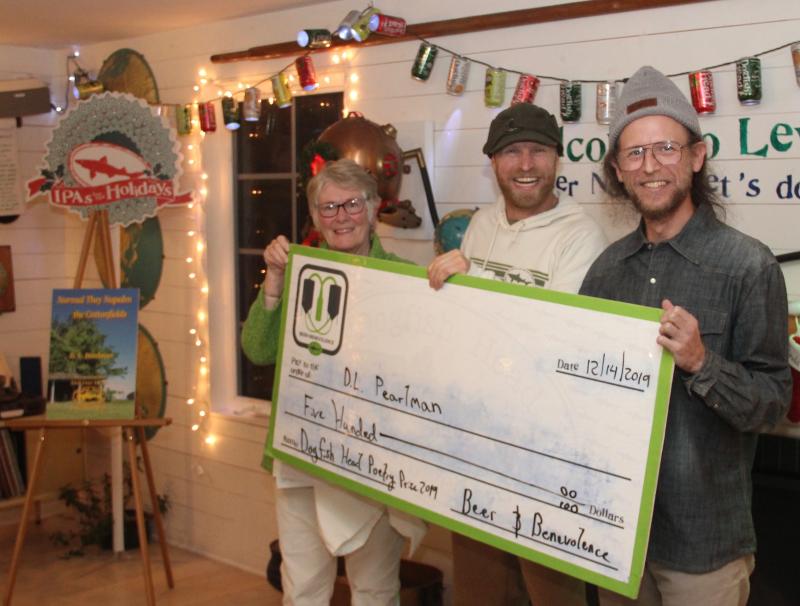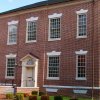Norfolk poet D.L. Pearlman wins 2019 Dogfish Head prize
“Silent seagulls struggle/ around the ragged flag flailing at a changeless half-mast./ The crabber steers west with the most-worn wheelpeg. – from “Bluecrabber,” a poem by D.L. Pearlman
Poets love language: The shape, sound and meaning of words as they form in phrases and sentences to present ideas, questions and observations. And poets and their works are usually the product of the environs where they live and labor.
Both are certainly characteristics of D.L. Pearlman, a Norfolk, Va. native and Tidewater Community College English professor recently awarded the 2019 Dogfish Head Poetry Prize. The poet received his award before a burning fire in the lobby of Lewes’s Dogfish Inn on a foggy Dec. 14 evening.
It’s clear from the work that the poet – a guitar-crazy musician – relies heavily on his ear for the words he chooses and juxtaposes in his phrasing. From “Stars At Dusk” - “Fear is fertile, says the sore/ back of a good ‘ol boy splitting wood./ Jars of peach and berry preserves/ prepare for winter. Why are barns red?”
From “Gig at Sidewalk in New York” - “Sultry, vulpine chick bends guitar, breathes fire,/ persuades hearts to hang out and order more.”
He also understands the human delight in rhyming words which further the songliness and magnetism of many of his poems.
Judges chose Pearlman’s collection of poems, called “Normal They Napalm the Cottonfields,” from the submissions of 10 finalists. The opening lines of “Cottonballs” explain the title of the collection: “It’s normal they napalm the cottonfields,/ call it exfoliate, burns off the leaves/ so the popping cotton comes out clean.”
In receiving his award, Pearlman said his work is narrative, “from intense and brutal to surreal.” He said he often spends weekends driving back roads around Norfolk – northward onto the Eastern Shore of Virginia and southward to the farmlands of Suffolk and North Carolina.
“I take photographs of broken-down houses and tractors, and poems kind of evolve from there,” he said. “I like Sundays and holidays, when there are less people around. Holidays are the best days to trespass. And they really do use napalm in the cottonfields – it makes the cotton easier to harvest.”
Afterward, in discussion around a table filled with cheese and meats, olives and crackers, Pearlman said there is a word for poetry inspired by visual art such as photography. “It’s called ekphrastic.”
Joseph Millar, author of “Kingdom,” was one of three judges for this year’s competition. “The poems in D. L. Pearlman’s collection are filled with the experience of this world,” said Millar. “I especially admire their gritty images of working life in a countryside worn down by time and weather, its crops and dirt roads, its shoreline and bays and woods.”
Grace Cavalieri, radio host of “The Poet and the Poem,” and current Maryland Poet Laureate, said Pearlman “sees every detail of grandeur in our failing earth, and makes the reader feel the rubble under his feet, ... A world ripe with ... richness and wreckage.”
Stephen Scott Whitaker, a poet, author and editor, and member of the National Book Critics Circle, said Pearlman “transforms America’s broken and littered landscapes into a song of woe and loss. ... (He) pulls no punches.” He added that the author “offers glimpses of hope in a world where life and struggle are synonymous, a country littered with garbage, both real and metaphorical.”
This is the 17th presentation of the annual Dogfish Head Poetry Prize, created by Sam Calagione, a literature major in college and CEO of Dogfish Head Craft Brewed Ales. The competition is open to residents of North Carolina, Virginia, West Virginia, Maryland, Delaware, New Jersey, Pennsylvania, New York, and the District of Columbia.
The annual prize consists of publication of the manuscript by the Broadkill River Press, 10 copies of the published book, $500 in prize money, two cases of Dogfish Head Craft Brewed Ale, and two nights’ stay at the Dogfish Inn.
Publication of the winning manuscript is supported in part by The Cape Gazette. Readers who wish to acquire a copy of “Normal They Napalm the Cottonfields” can purchase the book online at www.broadkillriverpress.com or at the Cape Gazette office on Nassau Commons Boulevard. The price is $15.
Sanctuary
Two Norfolk Southern engines hum eight thousand horses hot.
A hundred coal cars obey, cracking, clacking, ringing the bell of mobility.
Here’s to the urban planners for disallowing houses this close to the yard.
Unknowingly, this little lifepocket thrives: English ivy trails down to the marsh,
parsed for the opossums, raccoons, crows and the occasional homeless human
balled in his blanket. Can anyone reveal the half-life of a chainlink fence,
or does it depend on fallen trees or ease of bridging previous streets?
Sycamores sing the song of belonging to nearby or yonder, somewhere
to ponder the fortune of a forest in a city, owning a moment of sun and wind,
quiet and din of railroad friction, natural benediction, righteous realm of the elm,
holly and water oak bordering industry with brown leaf and broken branch
majesty for anyone bold enough to declare herself engineer of the minute.
– D.L. Pearlman






















































